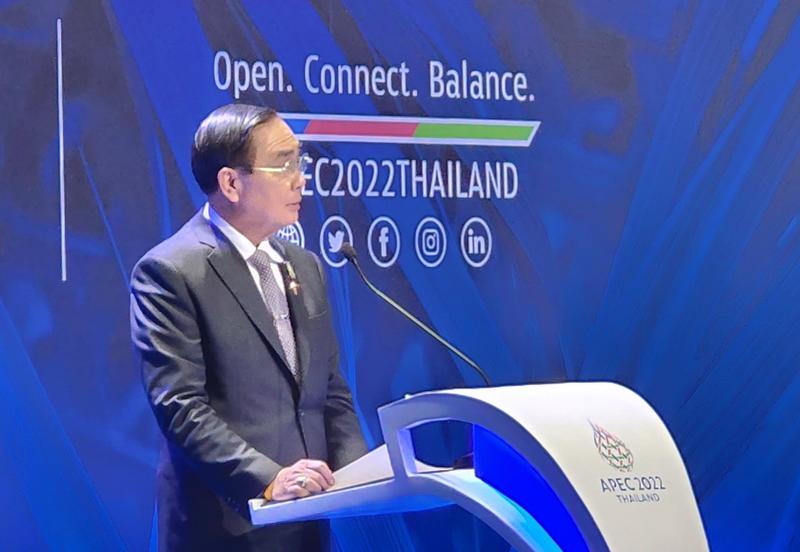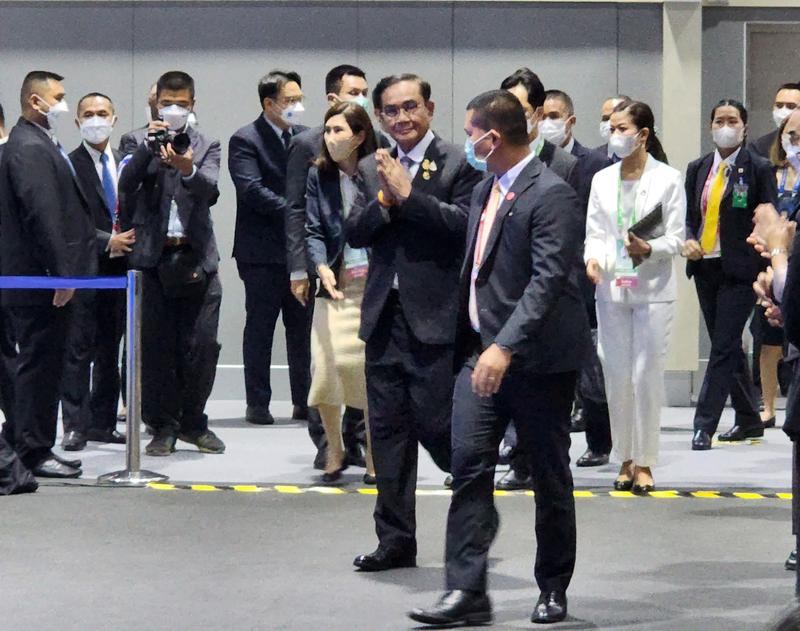 Thailand's Prime Minister Prayuth Chan-ocha, chair of the 29th Asia-Pacific Economic Cooperation (APEC) Economic Leaders' Meeting, holds a news conference at the end of the meeting on Nov 19 in Bangkok. (SHI XIAOFENG / CHINA DAILY)
Thailand's Prime Minister Prayuth Chan-ocha, chair of the 29th Asia-Pacific Economic Cooperation (APEC) Economic Leaders' Meeting, holds a news conference at the end of the meeting on Nov 19 in Bangkok. (SHI XIAOFENG / CHINA DAILY)
BANGKOK – APEC leaders on Saturday endorsed the Bangkok Goals on the Bio-Circular-Green (BCG) Economy – a comprehensive framework to further APEC’s sustainability objectives – and will advance these goals in a bold, responsive and comprehensive manner, merging existing commitments with new aspirational ones.
At a news conference at the end of a two-day meeting of APEC leaders, Thailand's Prime Minister, Prayuth Chan-ocha, also chair of the 29th meeting, said the talks also covered how to boost trade and investment in a post-pandemic environment under a planned Free Trade Area of the Asia Pacific.
Leaders reaffirmed their long-standing commitment to promote strong, balanced, secure, sustainable and inclusive growth as well as their commitment to realize the APEC Putrajaya Vision 2040, according to joint statement issued on Nov 19 after the 29th APEC Economic Leaders’ Meeting in Bangkok.
READ MORE: APEC CEOs stress cooperation for sustainable, inclusive growth
Putrajaya Vision 2040 is a mission statement adopted in 2020 for APEC, as: "Our vision is an open, dynamic, resilient and peaceful Asia-Pacific community by 2040, for the prosperity of all our people and future generations."
In 2021, the 21 APEC member economies developed the Aotearoa Plan of Action, to implement Putrajaya Vision 2040.
 Thailand's Prime Minister Prayuth Chan-ocha, chair of the 29th Asia-Pacific Economic Cooperation (APEC) Economic Leaders' Meeting, at a news conference after concluding the meeting on Nov 19 in Bangkok. (SHI XIAOFENG / CHINA DAILY)
Thailand's Prime Minister Prayuth Chan-ocha, chair of the 29th Asia-Pacific Economic Cooperation (APEC) Economic Leaders' Meeting, at a news conference after concluding the meeting on Nov 19 in Bangkok. (SHI XIAOFENG / CHINA DAILY)
The statement also called for an end to the Ukraine-Russia conflict. Russia, one APEC member, saw the absence of President Vladimir Putin from the meeting.
ALSO READ: APEC economic leaders highlight sustainable growth
Prayut said that APEC leaders’ first in-person meeting since the pandemic is a joint success of all APEC economies and all those who are involved at the meeting.
He said the Leaders’ Declaration 2022 adopted at the meeting reflects the work of APEC throughout the year with the concept of the BCG economy becoming an engine driving forward concrete outcomes under the theme “Open. Connect. Balance”.
In terms of the “Open” theme, Prayut said APEC has also prepared a multi-year work plan to continue dialogue on the free trade area of the Asia-Pacific in the post-COVID-19 global context and to prepare for new trade and investment issues.
“APEC has revived safe and seamless cross-border travel to prepare for future crisis,” said Prayut, referring to the element of “Connect”.
As a key outcome of this year’s APEC that addresses “Balance”, the Bangkok Goals on the BCG Economy was adopted at the meeting.
“We … are determined to uphold and further strengthen the rule-based multilateral trading system, with the WTO at its core,” the joint statement said, referring to the World Trade Organization.
The leaders said they are determined to achieve post-pandemic recovery and will reinforce systems to prepare for future crises, while recognizing that more intensive efforts are needed to address today’s challenges such as rising inflation, food security, climate change and natural disasters, among others.
Attendees at the in-person meeting include Chinese President Xi Jinping, Indonesian President Joko Widodo, Philippine President Ferdinand Romualdez Marcos Jr, Vietnamese President Nguyen Xuan Phuc and US Vice-President Kamala Harris. Thailand also invited leaders of France and Saudi Arabia to attend the APEC Leaders’ Informal Dialogue with Guests.
At the end of the leaders' meeting on Nov 19, Prayut handed over a “Chalom”, a woven bamboo basket, to Harris as an action to symbolize the handover of the APEC chairmanship from Thailand to the US, which will host the next APEC Leaders’ Meeting in San Francisco.
The APEC members comprise Australia, Brunei Darussalam, Canada, Chile, China, Indonesia, Japan, the Republic of Korea, Malaysia, Mexico, New Zealand, Papua New Guinea, Peru, the Philippines, Russia, Singapore, Thailand, the United States, and Vietnam, as well as Chinese Taipei and China's Hong Kong Special Administrative Region.


